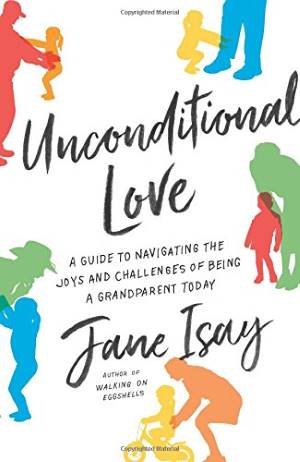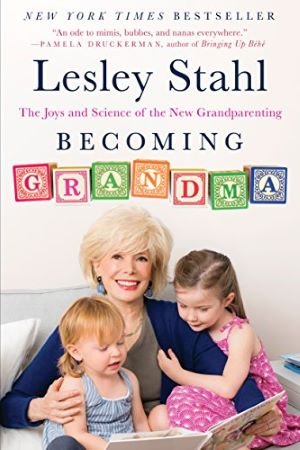THE BEST BOOKS
ON GRANDPARENTING
This page contains affiliate links to books I have personally chosen to share. I may receive a commission for purchases made through these links. Thank you for helping to support this site!
Unconditional Love by Jane Isay
A Guide to Navigating the Joys and Challenges of Being A Grandparent Today
Are you looking for help understanding the new dimensions to your family that being a grandparent creates? Whether you have a strong and wonderful relationship with your child and their spouse or not, Unconditional Love provides solid advice for forming the bond you wish to form with your grandchildren. Isay's acknowledgement of the conflicts, problems and politics of family life provides a framework for creating a healthy relationship with your grandchildren and their parents. Through interviews, research and her own experience, Isay provides plenty of food for thought for anyone who wants to make the most of being a grandparent. Well worth buying this one, as it will be a useful reference in the years to come.
The Grandest Love: Inspiring the Grandparent-Grandchild Connection by Jerry Witkovsky
“All along, I had been grandparenting solely by instinct and habit when what I really needed to do was to grandparent consciously, deliberately, and by design.”
Author Jerry Witkovsky was not alone in approaching his role as grandparent from instinct and habit. Most grandparents do the same, assuming that love and enthusiasm are enough. In The Grandest Love: Inspiring the Grandparent-Grandchild Connection, Witkovsky makes the case for another way of grandparenting: consciously, deliberately and by design. This more intentional approach is the key to creating relationships that will sustain and enrich the lives of the entire family.
Witkovsky was a social-work professional long before he became a grandparent. His professional experience convinced him that the grandparent-grandchild relationship has the power to strengthen families and communities. In The Grandest Love, he shares the results of over 25 years of studying grandparents and the influence they can have on their families. Continued
The Mindful Grandparent: The Art of Loving Our Children's Children by Marilyn McEntyre and Shirley Showalter
Through a series of insightful essays, Marilyn McEntyre and Shirley Showalter join us on that learning edge. As they reflect on the joys and struggles of grandparenting, the authors encourage grandparents to observe, listen and learn from the younger generations.
Unlike most books filled with essays on grandparenting, The Mindful Grandparent: The Art of Loving Our Children's Children does more than just muse on the authors’ own experiences. Each chapter ends with suggestions and resources, giving readers room to grow into their own understanding of the topic at hand. For example, the chapter on “Grandparent Camp” shares Shirley’s experience with her own grandchildren and thoughts of why such powerful memories are made during their Grandparent Camp weeks. She then provides ideas for getting more information to plan your own camp for your grandchildren, and further reading on making memories. Continued...
The Gift of Play: How Grandparents Enhance the Lives of Young Children by Judith Van Hoorn
Are you an energetic grandparent who loves to get in on your grandchildren’s games, or one who prefers to observe them as they play? In either case, you’ll find The Gift of Play both fascinating and helpful. Van Hoorn’s book explores and explains the importance of play for children, and how grandparents can foster and participate in their games and interests.
I consider myself more of an observer than a playmate, yet The Gift of Play expanded my understanding of play and made me realize I participate quite often. Reading stories, exploring math and nature, and enjoying art and music are all forms of play for children, and I love those activities. Judith Van Hoorn provides background on how a child’s mind develops and how play fosters that development, plus activity tips and charming stories of grandparents and grandchildren playing together. Continued...
Being a Proactive Grandfather by Richard Eyre
Looking for books for a new grandfather? Not so easy! So far, I’ve only found one: Being a Proactive Grandfather by Richard Eyre.
Luckily, it’s all any grandfather really needs. Eyre, as a grandfather to roughly 30 grandchildren, has enough experience to know what works. He shares his creative and practical ideas in a way that makes you wish you could get started right away. While some of his methods will be difficult for long-distance grandfathers or those who are still actively working, the concepts behind them will inspire every grandfather who is committed to a real relationship with their grandchildren. Continued...
Camp Granny by Sharon Lovejoy
“[Grandmother and I] approached every day together as an adventure, filled with the simple joys and discoveries that are fresh and new to a child and that can also make a grandmother feel fresh and new again.” Sharon Lovejoy, Camp Granny
If you want to impart a sense of wonder in your grandchildren, Camp Granny is a must. Lovejoy provides simple, inexpensive ideas for tapping into your grandchild’s curiosity and creativity. From setting up your home before your grandchildren come to visit to making bean soup into a lesson in growing, she will guide you through adventures that you’ll enjoy as much as your grandchildren will. The book itself is beautiful and well-written. Put this on your wishlist, or treat yourself to it today. Just make sure you read it before your grandchildren’s next visit!
Nanaville by Anna Quindlen
One of the greatest compliments I've ever received was when someone compared my writing to Anna Quindlen. Her honest, heartfelt stories are instantly relatable, and Nanaville is no exception.
Whether you are looking for advice on how to navigate the role of grandparent or are just looking for a good book for your next flight to your grandchildren's house, you can't help but enjoy Quindlen's look at her life as Nana.
This is a grandmothering book worth buying!
Becoming Grandma by Lesley Stahl
When Lesley Stahl became a grandmother, she was stunned by the way it affected her emotionally. Ever the reporter, she set about to find out whether her experience was the norm. Becoming Grandma is the engaging, informative result of her research. As she shares stories of her transformation into Grandma, she explores the ways grandparents can play an important role in their grandchildren’s lives. Stahl offers insight into the complexities of a being a grandparent in today’s world, where a child may have four sets of grandparents and parents are inundated with parenting advice from the internet. This well-researched book is well worth reading--buy a copy and lend it out to your grandmother friends.
When Being a Grandma Isn’t So Grand by Donne Davis
When Donne Davis became a grandmother, she gathered a circle of women who were as “gaga” over their grandbabies as she was. They named themselves the GaGa Sisterhood, and became an important source of support for one another as they navigated their new role. Over the years, she has shared the collective wisdom of the GaGa Sisterhood on her website and blog, and in a small but mighty book called When Being a Grandma isn’t So Grand.
Davis’ book is a quick read, but offers a valuable lesson for all grandparents about prioritizing the relationship with your grandchild's parents. Although it is aimed at grandmothers, the insight it offers will be just as beneficial for grandfathers. Davis interviewed 50 mothers to better understand what they needed—and didn’t need—from grandparents. She shares her discoveries in a few short chapters, often in the moms’ own words. Her clear and engaging writing will give the reader a better understanding of how to support parents and avoid some of the pitfalls that can sour a relationship.
When Being a Grandma isn’t So Grand is a great companion to New Grandparent Essentials, and a worthwhile addition to any grandparent’s library.
Camp Grandma by Marianne Waggoner Day
Next-Generation Grandparenting--Beyond Babysitting
If you pick up Camp Grandma expecting a book to help you plan a week of fun activities for your grandchildren, you may find it lacking. If you pick it up looking for ways to deepen your relationship with your grandchildren, pass along your gifts and values, or help them become successful adults, you won’t be disappointed.
Marianne Waggoner Day approaches time with her grandchildren as a retired corporate executive. The lessons she takes from her time in the business world are among the values she wants to pass along to her four grandchildren. She established Camp Grandma to “establish a structure where my four grandkids could come together and through shared experiences truly learn about each other and maybe more about themselves.” Continued...











